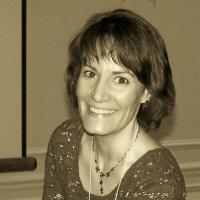Julie Reynolds, Professor of the Practice

Julie Reynolds has a Ph.D. in biology but, through a series of unexpected events, became an expert in writing pedagogies. She spent 5 years learning to teach writing as a postdoctoral fellow in Duke University’s first-year writing program before transitioning to the biology department where she has taught science writing and writing-intensive courses to thousands of undergraduates and graduate students. With over a decade of funding from the National Science Foundation, her disciplinary-based education research has focused on how writing assignments can promote deep, conceptual learning, especially in large science courses. Dr. Reynolds is also a writing coach and has helped hundreds of scientists across the country to increase their productivity while reducing stress associated with writing.
Education:
Ph.D., University of California, Berkeley, 2001
M.S., University of California, Davis, 1994
B.A., Pomona College, 1990
Office Location: 130 Science Drive, 034 Biological Sciences Bldg, Durham, NC 27708
Email Address: julie.a.reynolds@duke.edu
Web Page: http://sites.duke.edu/reynoldslab/
- Office Hours:
Please use this link to schedule an appointment with me
Specialties:
Ecology and Population Biology
Research Categories: Scholarship of Teaching and Learning, Science Literacy and Civic Engagement, Writing-to-learn pedagogies
Research Description:
Areas of Interest:
Writing-to-learn pedagogies in STEM disciplines
Assessing the extent to which biology courses promote science literacy, understanding of the nature of science, critical thinking skills, and enthusiasm for biology
Assessing the efficacy of teaching technologies at promoting student learning (e.g., Calibrated Peer Review™, iPods, iPads, FlipVideo)
Assessing learning outcomes associated with the pedagogy of Research Service Learning (RSL)
Recent Publications (More Publications) (search)
- Thompson, RJ; Schmid, L; Mburi, M; Dowd, JE; Finkenstaedt-Quinn, SA; Shultz, GV; Gere, AR; Schiff, LA; Flash, P; Reynolds, JA, Diversity of undergraduates in STEM courses: individual and demographic differences in changes in self-efficacy, epistemic beliefs, and intrapersonal attribute profiles, Studies in Higher Education, vol. 49 no. 4 (January, 2024), pp. 690-711, Informa UK Limited [doi] [abs].
- Marion, SB; Reynolds, JA; Schmid, L; Carter, BE; Willis, JH; Mauger, L; Thompson, RJ, Beyond Content, Understanding What Makes Test Questions Most Challenging, BioScience, vol. 73 no. 3 (March, 2023), pp. 229-235 [doi] [abs].
- Finkenstaedt-Quinn, SA; Gere, AR; Dowd, JE; Thompson, RJ; Halim, AS; Reynolds, JA; Schiff, LA; Flash, P; Shultz, GV, Postsecondary Faculty Attitudes and Beliefs about Writing-Based Pedagogies in the STEM Classroom., CBE life sciences education, vol. 21 no. 3 (September, 2022), pp. ar54 [doi] [abs].
- Thompson, RJ; Finkenstaedt-Quinnb, SA; Shultz, GV; Gere, AR; Schmid, L; Dowd, JE; Mburi, M; Schiff, LA; Flashg, P; Reynolds, JA, How faculty discipline and beliefs influence instructional uses of writing in STEM undergraduate courses at research-intensive universities, Journal of Writing Research, vol. 12 no. 3 (February, 2021), pp. 625-656 [doi] [abs].
- Mourad, TM; McNulty, AF; Liwosz, D; Tice, K; Abbott, F; Williams, GC; Reynolds, JA, Erratum: The Role of a Professional Society in Broadening Participation in Science: A National Model for Increasing Persistence (BioScience DOI: 10.1093/biosci/biy066), BioScience, vol. 71 no. 1 (January, 2021), pp. 104 [doi] [abs].